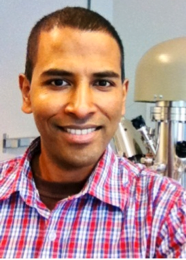Go to
Sidharam P. Pujari
H-terminated Si(111) modification with trans-enynes: densely packed and highly stable monolayers
An enhanced monolayer quality, faster monolayer formation and an increased surface coverage of the alkenyl monolayers, in combination with the inhibition of oxidation of the silicon substrate due to dense packaging, allows for the implementation of organic monolayers on oxide-free silicon in molecular electronic and biosensor devices. Especially in view of the importance of a defect-free monolayer structure and corresponding stability of the monolayer−silicon interface, this research can provide valuable insight.

Figure 1. Nucleophilic attack of 3-en-1-ynes to delocalized radical cations at the silicon surface result in the formation of b-carbon radicals. Subsequent transfer of a hydrogen atom from a neighboring Si-H site then results in the formation of a surface-centered radical.
On H−Si(111), monolayer assembly with 1-ene-ynes yields di-alkenyl monolayers with a Si−C═C-C=C linkage. Five 1-ene-ynes, of length C8, C10, C12, C14 and C16, are going to be synthesized and attached to hydrogen-terminated Si(111) (Fig. 1), to investigate the influence of the chain length on the final monolayer structure. These monolayers are synthesized by a thermal initiation method. The monolayers are going to be characterized with various techniques. The influence of the chain length on the organic monolayers is going to be studied in detail with molecular modeling via PCFF molecular mechanics calculations on periodically repeated slabs of modified Si surfaces. For each monolayer, the packing energies, structural properties, and deformation energies of the Si surfaces for numerous substitution percentages and substitution patterns will be determined.
1 B. Rijksen, S.P. Pujari, L. Scheres, C.J.M. van Rijn, J.E. Baio, T. Weidner, and H. Zuilhof, Langmuir 2012, 28 (16), 6577-6588.
2 Y. Li, S. Calder, O. Yaffe, D. Cahen, H. Haick, L. Kronik, and H. Zuilhof, Langmuir 2012, 28 (26), 9920-9929.
About the speaker:
 Sidharam P. Pujari received a bachelor's degree in Chemistry at the Shivaji University India and a master's degree in Inorganic Chemistry (Bio-Inorganic) at the University of Pune, India. After his master degree he has worked in Homogeneous Catalyst Division, National Chemical Laboratory Pune (NCL), India. Then he started as a researcher in Taiwan in the field of Polymer Chemistry, Chemical Engineering Division, National Taiwan University Science and Technology, Taipei (NTUST) under guidance of Prof. Der-Jang Liaw. Currently, he is a PhD student at Laboratory of Organic Chemistry, Wageningen University in Netherlands, working in the field of Surface/Material Chemistry under the supervision of Prof. Han Zuilhof and Prof. Cees van Rijn.
Sidharam P. Pujari received a bachelor's degree in Chemistry at the Shivaji University India and a master's degree in Inorganic Chemistry (Bio-Inorganic) at the University of Pune, India. After his master degree he has worked in Homogeneous Catalyst Division, National Chemical Laboratory Pune (NCL), India. Then he started as a researcher in Taiwan in the field of Polymer Chemistry, Chemical Engineering Division, National Taiwan University Science and Technology, Taipei (NTUST) under guidance of Prof. Der-Jang Liaw. Currently, he is a PhD student at Laboratory of Organic Chemistry, Wageningen University in Netherlands, working in the field of Surface/Material Chemistry under the supervision of Prof. Han Zuilhof and Prof. Cees van Rijn.
Secondary navigation
- EPFL Workshop on Logic Synthesis and Emerging Technologies
- Luca Amaru
- Luca Benini
- Giovanni De Micheli
- Srini Devadas
- Antun Domic
- Rolf Drechsler
- Pierre-Emmanuel Gaillardon
- Jie-Hong Roland Jiang
- Akash Kumar
- Shahar Kvatinsky
- Yusuf Leblebici
- Shin-ichi Minato
- Alan Mishchenko
- Vijaykrishnan Narayanan
- Ian O'Connor
- Andre Inacio Reis
- Martin Roetteler
- Julien Ryckaert
- Mathias Soeken
- Christof Teuscher
- Zhiru Zhang
- Symposium on Emerging Trends in Computing
- Layout synthesis: A golden DA topic
- EPFL Workshop on Logic Synthesis & Verification
- Luca Amaru
- Luca Benini
- Robert Brayton
- Maciej Ciesielski
- Valentina Ciriani
- Jovanka Ciric-Vujkovic
- Jason Cong
- Jordi Cortadella
- Giovanni De Micheli
- Antun Domic
- Rolf Drechsler
- Henri Fraisse
- Paolo Ienne
- Viktor Kuncak
- Enrico Macii
- Igor Markov
- Steven M. Nowick
- Tsutomu Sasao
- Alena Simalatsar
- Leon Stok
- Dirk Stroobandt
- Tiziano Villa
- Symposium on Emerging Trends in Electronics
- Raul Camposano
- Anantha Chandrakasan
- Jo De Boeck
- Gerhard Fettweis
- Steve Furber
- Philippe Magarshack
- Takayasu Sakurai
- Alberto Sangiovanni-Vincentelli
- Ken Shepard
- VENUE
- Panel on Circuits in Emerging Nanotechnologies
- Panel on Emerging Methods of Computing
- Panel on The Role of Universities in the Emerging ICT World
- Panel on Design Challenges Ahead
- Panel on Alternative Use of Silicon
- Nano-Bio Technologies for Lab-on-Chip
- Functionality-Enhanced Devices Workshop
- More Moore: Designing Ultra-Complex System-on-Chips
- Design Technologies for a New Era
- Nanotechnology for Health
- Secure Systems Design
- Surface Treatments and Biochip Sensors
- Security/Privacy of IMDs
- Nanosystem Design and Variability
- Past Events Archive
